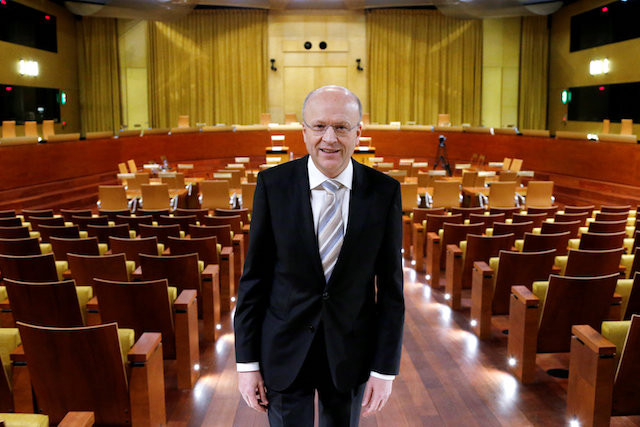Koen Lenaerts, president of the Court of Justice of the European Union, stressed the political process was in its early stages.
The ECJ cannot act on its own initiative and it was impossible to foretell what aspects of Brexit might be referred to it by national courts via cases raised by various parties.
But asked if such a momentous EU political crisis was likely to end up at the Luxembourg-based court, the Belgian jurist said: “Yes, it is.”
Even “a lawyer with the wildest imagination” would be unable to anticipate exactly how, he emphasised: “But it probably will, one day or another, end up on the docket of the Court - not because of the Court, but because of parties bringing the case.”
Citing as an example a judgment two decades ago that forced a change to EU banana trade pacts with Latin American states, Lenaerts said the ECJ could ultimately oblige the Union to amend any post-Brexit trade deal it might strike with Britain -- though he stressed this was a purely speculative reflection.
The main courtroom of the European Court of Justice, in Kirchberg, is pictured on 26 January 2017. Photo: Reuters/Francois Lenoir
His comments raised the possibility that Britain’s divorce terms from the EU could ultimately be shaped by the very court whose jurisdiction it is determined to escape, as Prime Minister Theresa May spelt out in a speech last month.
The prospect of court battles going on well after Brexit, expected to take effect in about two years’ time, underlines the uncertainty surrounding the process, which is outlined in a bare 261 words in Article 50 of the EU’s Lisbon Treaty.
British judges have already upheld some private complaints to oblige May to change tack on how the government launches the process and at least one case is under way, in Ireland, which campaigners hope can trigger an ECJ review of her plan.
European Court of Justice president Koen Lenaerts poses inside the main courtroom in Luxembourg on 26 January 2017. Photo: Reuters/Francois Lenoir
A spokesman for May, commenting on Lenaerts’ remarks, said she was clear that Brexit would mean leaving the jurisdiction of the ECJ. “Clearly where we’re going to be in two and a bit years time as a result of the negotiations that we go into with the other members states is impossible to predict,” he added.
“SPLENDID ISOLATION”
Lenaerts, a 28-year veteran of the EU courts who has led the ECJ since 2015, stressed that, unlike the U.S. Supreme Court, the EU judges cannot decline to take a case, but insisted they would rule only on legal arguments, not politics.
Speaking in his modern chambers, from where he enjoys a panoramic view over Luxembourg’s rural hinterland, he said the Court marked itself out as an independent institution in “splendid isolation” from Brussels and Europe’s power capitals.
The judges meeting room, called the “Salle de deliberes”, is seen at the European Court of Justice on 26 January 2017. Photo: Reuters/Francois Lenoir
There was no question of its judges offering advice, however informally, to those negotiating any treaties as to what might meet their eventual approval, the 62-year-old judge said. Nor would the court take political sides in favour of the Union.
He rejected suggestions by some legal analysts that the ECJ has played an activist role in strengthening federal powers for Brussels or delivered rulings to quell rising euroscepticism -- for example, in backing states’ moves to curb the ability of new or recent immigrants to claim benefits in other EU countries.
These were, Lenaerts said, the result of governments sharpening their own legislation, not of judicial flip-flopping by the court, which had previously upheld the broad rights of Europeans to claim benefits while looking for work in other member states.
Koen Lanaerts, president of the European Court of Justice, speaks during an interview with Reuters, in Luxembourg, on 26 January 2017. Photo: Reuters/Francois Lenoir
“We are not pro-Union, we are not against Union,” he said. “We are pro-law. The law is made by the political process.”
In that process, he said, politicians often found it useful to leave “grey zones” in legislation where they could not agree. It was the task of the Court to offer clarity, when cases are brought to it, on what is compatible with the Union’s treaties.
Asked about British newspaper attacks on judges who ruled against the government on Brexit - one branded them “Enemies of the People” - Lenaerts noted that the ECJ’s 28 judges, one from each EU state, tend to keep a lower profile.
The judges meeting room, called the “Salle de deliberes”, is seen at the European Court of Justice on 26 January 2017. Photo: Reuters/Francois Lenoir
In contrast to Supreme Courts in Britain or the United States, they do not publish personal votes on cases or any dissenting opinions, he noted.
“We certainly do not feel immune to criticism,” he added, however. “Criticism is something very constructive. A court is operating in a real world context.”
But in 28 years on the European Union bench, he said, “I have never ever, even in the most sensitive cases, felt any form of pressure, influence. Nothing. Not before, during or after.
“And that’s how it must be.”
(Reporting by Alastair Macdonald; Editing by Tom Heneghan)





